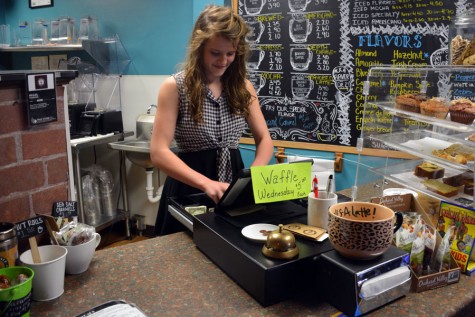Small businesses prove value to teen workers
Small businesses can be found just about anywhere in the United States. This includes our city of Owatonna. One thing that comes to mind when an Owatonna native thinks of small businesses is the downtown area, where many places of business are. Such as, Central Park Coffee and Costa’s Candies & Restaurant.
Because of the size of these businesses, it makes all the difference if they can appeal to teens. Which is why having teens as employees is a dual-beneficial relationship. The teenage employee receives an income, and learns to handle time and their responsibilities. The employer gains another set of helping hands and a way to spread their business around in the close knit community that is the high school. More often than not, when a place is amazing or well known, word spreads.
Sophomore Ellen “Ellie” Boisen and senior Holly Piper both work in small businesses. Boisen works at Central Park Coffee and Piper at Costa’s. Both have a shared expression of love for their job. The motives behind many teens joining the workforce vary, but can be generalized into one statement, to earn money. What they plan to do with the money can vary as well. Some do it for themselves, or for their family and others do it to prepare for future expenses, such as college or buying a car. Some of the benefits of working in a small business compared to a fast food chain are that, according to Boisen, “It’s more a community effort and there is better communication with the customers that come in. I feel like a smaller business is more humble and is able to customize their look easily and create a unique identity that we get to be a part of.”

Because teens are so often preoccupied with school, family and, perhaps, extracurricular activities, they may not be able to get what they deem a satisfying work schedule. According to “Nearly 80 Percent Of Students Work While In School” by Marina Fang, an article published in 2013, the average teen works between 10-15 hours a week, but many work more than 20 hours. The article stated that the statistic also includes students from high school, along with students of higher education. A reason why the hours vary is due to age, teen workers under 16 have a limited time frame as to when they are allowed to work. Once a child reaches 16+, they are able to work more hours, begin earlier and end later into the night. According to minimumwage.com, the minimum wage in Minnesota, 2015, is eight dollars per hour. Some jobs pay more but if we do the math between minimum wage and average hours. The average working teen earns around $80-120 a week. The more hours you put in or the higher your wage, the more money you would earn. With all this potential cash to be earned, students must remember their educational commitments and make sure they have time for school and fun.
Small businesses do not run all night like some of the bigger chains. The downtown area of Owatonna generally is closed for the night by 5 P.M. With several exceptions, such as Nick’s Pizza Palace, that opens at 5 P.M. rather than close, and many have extended hours on Thursdays. Due to the early closings, it can be difficult for students in extracurricular activities to get many hours.
Teens are important to small businesses because they bring in a youthful energy that many of the regulars enjoy and another set of hands that can be used to help in the business affairs.

Stuff about me: I'm a senior. I participate in Wrestling. I am Hispanic. I'm drug-free. I'm 17 years old. I have a family of nine plus one dog. I wear...

